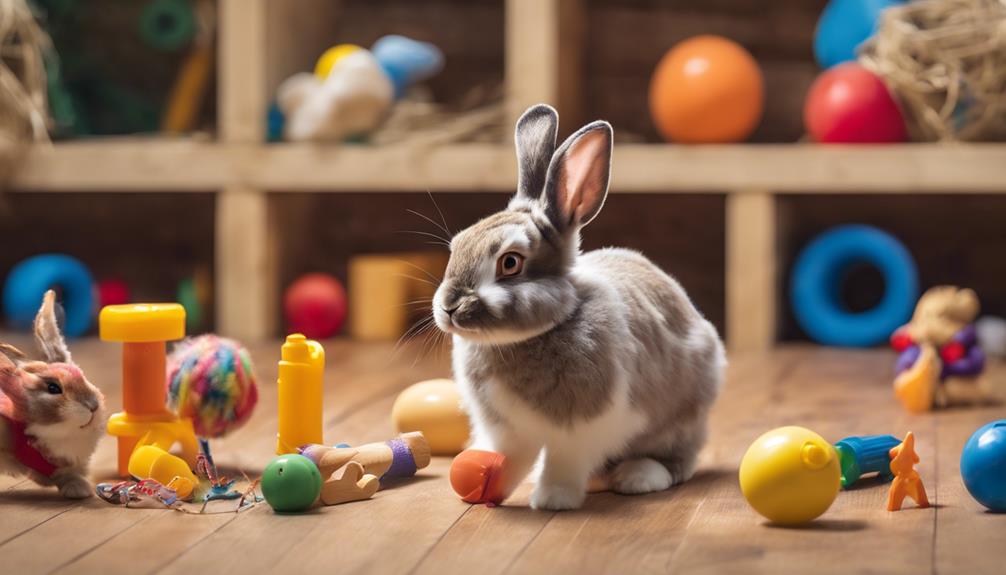Why Is Rehabilitation Essential for Rescued Rabbits?
Rehabilitation is vital for rescued rabbits to ensure their physical and emotional well-being. It helps in their recovery and eventual return to a safe environment. By assessing health, providing shelter, establishing feeding routines, socializing, and monitoring behavior, you can aid their rehabilitation. Regular veterinary care, encouraging exercise, and gradually reintroducing them to nature are key steps. Each aspect contributes to their overall well-being and adjustment. Remember, every element of their care is crucial in helping them thrive after being rescued.
Assessing the Rabbit's Health
When examining a rescued rabbit's health, carefully observe their behavior and physical condition for any signs of distress or illness. Nutritional needs play a crucial role in a rabbit's health. Ensure they've a balanced diet rich in hay, fresh vegetables, and a limited amount of pellets to maintain optimal health. Monitoring their grooming habits is also essential. Rabbits are meticulous groomers; any changes in their grooming routine could indicate an underlying health issue.
Behavioral patterns are windows into a rabbit's well-being. Pay attention to how active they are, their eating and drinking habits, and how they interact with their environment. Any sudden changes in behavior could be a red flag for health concerns. Environmental stressors can greatly impact a rescued rabbit's health. Ensure their living space is quiet, clean, and free from potential dangers. Stress can weaken their immune system, making them more susceptible to illnesses.
Providing Safe Shelter
Ensuring a safe shelter is essential for the well-being and recovery of rescued rabbits. When providing a safe shelter for a rescued rabbit, consider the following:
- Habitat Design: Create a spacious and secure environment that allows the rabbit to move freely, with separate areas for eating, sleeping, and playing.
- Bonding Techniques: Implement bonding techniques such as positive reinforcement and spending quality time with the rabbit to build trust and create a strong bond.
- Nutrition Assessment: Conduct a thorough assessment of the rabbit's nutritional needs and provide a well-balanced diet consisting of hay, fresh vegetables, and a small amount of pellets to promote good health.
- Behavior Training: Use positive reinforcement techniques to train the rabbit on desired behaviors like litter box usage and social interactions to help them adjust to their new environment.
- Safe Hideouts: Offer safe hideouts such as cardboard boxes or tunnels where the rabbit can retreat to when feeling scared or stressed, providing them with a sense of security.
Establishing a Feeding Routine
To continue helping your rescued rabbit thrive, establishing a consistent feeding routine is key to supporting their health and well-being. Understanding your rabbit's feeding habits and dietary requirements is crucial. Rabbits are herbivores and need a diet rich in hay, fresh vegetables, and a small amount of pellets. Hay should make up the majority of their diet, providing essential fiber for their digestive health. Fresh vegetables like dark leafy greens and carrots offer vital nutrients and hydration.
Mealtime consistency is essential for rabbits as they thrive on routine. Try to feed your rabbit at the same times each day to establish a predictable schedule. This helps reduce stress and allows your rabbit to feel secure in their environment. Portion control is equally important. Overfeeding can lead to obesity and related health issues. Follow recommended guidelines for the amount of pellets and vegetables to offer based on your rabbit's size and weight.
Monitoring your rabbit's eating habits is crucial. Any sudden changes in appetite or weight should be noted and discussed with a veterinarian. By providing a balanced diet, maintaining mealtime consistency, and practicing portion control, you're actively promoting the health and well-being of your rescued rabbit.
Socializing and Bonding
Establishing a strong bond with your rescued rabbit is essential for their socialization and well-being. Building trust and fostering a connection will help your rabbit feel safe and secure in their new environment.
Here are some tips to help you socialize and bond with your rabbit effectively:
- Trust building activities: Engage in activities that help your rabbit learn to trust you, such as hand-feeding treats or spending quiet time together.
- Socializing techniques: Introduce your rabbit to new environments and experiences slowly to prevent overwhelming them and build their confidence.
- Bonding exercises: Regularly interact with your rabbit through gentle petting, talking to them softly, and providing enrichment activities.
- Interaction strategies: Observe your rabbit's body language to understand their preferences and boundaries, allowing for positive interactions.
- Patience and consistency: Building a strong bond takes time, so be patient and consistent in your interactions with your rabbit.
Monitoring Behavior Changes
Monitoring your rescued rabbit's behavior changes is crucial for ensuring their well-being and adjustment to their new environment. Behavioral observation is key to understanding how your rabbit is adapting. Watch for signs of stress, fear, or aggression, as these can indicate they need more support. Positive behaviors like exploring, eating well, and interacting with toys show they're settling in.
Implement training techniques to help your rabbit feel secure and build trust with you. Use positive reinforcement, like treats and gentle petting, to encourage good behavior. Consistent routines and gentle handling can aid in their adjustment period. Mental stimulation is vital for their well-being. Provide enrichment activities like puzzle feeders, tunnels, and chew toys to keep them engaged and prevent boredom.
Regularly interacting with your rabbit will strengthen your bond and allow you to notice any changes in behavior promptly. Spend time observing them in their environment to understand their preferences and habits better. Creating a safe and enriching space for your rabbit will promote a positive adjustment period and overall well-being. Remember, patience and understanding are crucial as your rescued rabbit adapts to their new life.
Veterinary Care and Check-ups
Ensuring your rescued rabbit's health and well-being includes prioritizing regular veterinary care and check-ups. Regular check-ups are crucial for monitoring your rabbit's overall health and catching any potential issues early on. Here are some important points to consider regarding veterinary care for your rescued rabbit:
- Schedule routine check-ups: Just like humans, rabbits benefit from regular visits to the veterinarian to ensure they're healthy and to address any concerns promptly.
- Stay up to date on vaccinations: Vaccinations are essential to protect your rabbit from common diseases and should be administered as recommended by your veterinarian.
- Address any medical concerns promptly: If you notice any changes in your rabbit's behavior, appetite, or overall well-being, it's important to seek medical treatment promptly.
- Monitor dental health: Rabbits' teeth are continually growing, so regular dental check-ups are crucial to prevent dental issues that can affect their overall health.
- Discuss spaying or neutering: Your veterinarian can provide guidance on the benefits of spaying or neutering your rabbit, which can help prevent certain health issues and unwanted behaviors.
Encouraging Exercise and Play

How can you incorporate fun and engaging activities to promote exercise and play for your rescued rabbit?
It's crucial to provide your rabbit with opportunities for physical and mental stimulation to support their rehabilitation journey. Interactive toys are a fantastic way to encourage exercise and play. Toys such as puzzle feeders, tunnels, and balls can keep your rabbit entertained while promoting movement. Enrichment activities like hiding treats around their living space or providing different textures for them to explore can also help stimulate their curious nature.
Outdoor play is another excellent way to encourage exercise and exploration. Ensure the outdoor area is safe and secure, then allow your rabbit supervised time to hop around, graze, and discover new scents and sights. This outdoor time not only provides physical exercise but also mental stimulation that's essential for their well-being.
Gradual Reintroduction to Nature
When reintroducing your rescued rabbit to nature, proceed gradually to ensure their comfort and safety as they adjust to the outdoor environment. It's essential to consider various factors to make this transition smooth and beneficial for your rabbit.
- Behavior Observation: Watch your rabbit closely as they explore the outdoors. Look for signs of fear, stress, or excitement. Adjust the pace based on their reactions to ensure they feel secure.
- Environment Adjustment: Create a safe outdoor space for your rabbit. Remove any potential hazards and provide hiding spots for them to feel secure. Gradually introduce new elements to prevent overwhelming your rabbit.
- Nutrition Evaluation: Monitor your rabbit's diet during the reintroduction process. Ensure they've access to fresh water and a balanced diet. Consult with a veterinarian to make any necessary adjustments.
- Activity Pacing: Allow your rabbit to set the pace for outdoor activities. Let them explore at their own speed and avoid forcing them into unfamiliar situations. Provide a balance between rest and playtime.
- Bonding Time: Spend quality time with your rabbit outdoors. Engage in gentle activities to strengthen your bond and build trust. Enjoy the experience together while promoting a sense of security and comfort.
Frequently Asked Questions
What Are the Common Challenges in Rehabilitating Rescued Rabbits?
When rehabilitating rescued rabbits, challenges often arise in building trust and applying socialization techniques. These furry friends may be frightened or traumatized, making it crucial to approach with patience and understanding.
Creating a safe environment and gradually introducing positive interactions can help them adjust. Consistent care and gentle handling are key to helping them overcome their past experiences and thrive in their new homes.
How Can I Help a Rabbit Overcome Fear and Trauma?
To help a rabbit overcome fear and trauma, start by building trust. Spend time near the rabbit, moving slowly and speaking gently. Offer treats to create positive associations. Consistent care and patience are key.
Behavioral training can also aid in addressing specific fears. Gradually expose the rabbit to new experiences in a safe environment. Seek guidance from a veterinarian or animal behaviorist for additional support.
Are There Specialized Diets for Rehabilitating Rabbits?
When rehabilitating rabbits, specialized nutrition plays a crucial role in their recovery. These furry friends have unique dietary requirements that need to be met to support their healing process.
Providing a balanced diet tailored to their needs can aid in their physical and emotional well-being. Alongside behavioral therapy and trust-building exercises, proper nutrition ensures that rescued rabbits have the best chance at a full and healthy rehabilitation journey.
Can Rescued Rabbits Form Bonds With Humans After Trauma?
When helping rescued rabbits recover, trust building and socialization are crucial for forming bonds with humans after trauma.
Through behavior modification and emotional healing, these rabbits can learn to trust and feel safe around people again.
How Long Does the Rehabilitation Process Typically Take for Rabbits?
Rehabilitation time for rabbits varies based on their needs. Progress tracking is crucial during this process. Behavioral changes may take time to observe.
Socialization techniques can aid in bonding. The time commitment involved in rehabilitating rescued rabbits may span weeks or even months. Patience and consistency are key in helping these animals heal and adapt.
Conclusion
In conclusion, rehabilitation is essential for rescued rabbits to ensure their physical and emotional well-being. By providing proper care, shelter, socialization, and veterinary attention, you can help these rabbits recover and thrive.
Remember to be patient and understanding as they adjust to their new environment and routine. With your love and support, rescued rabbits can have a second chance at a happy and healthy life.
